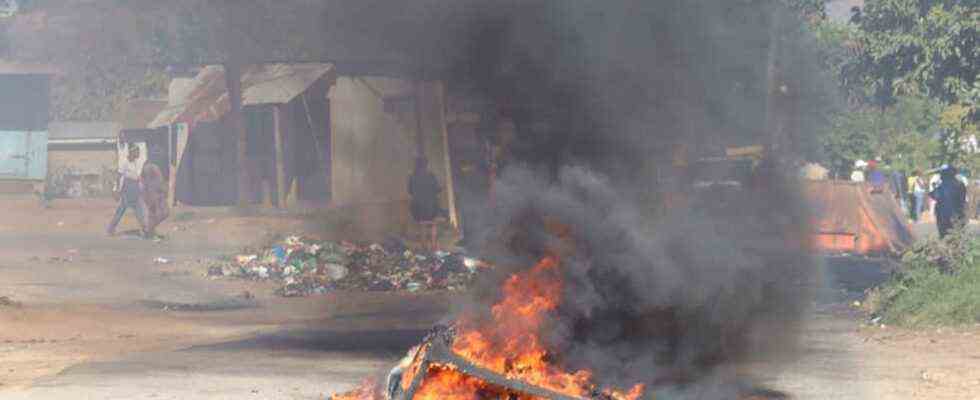As of: 07/09/2021 2:29 p.m.
With brutal violence, King Mswati III. put down the protests in Eswatini, dozens of people lost their lives. The demonstrators hope for reforms, but there is no organized opposition.
From Richard Klug,
ARD studio Johannesburg
“I was on my way to go shopping. All around me were people going to work. Suddenly an army truck drove towards us,” says a young man from Eswatini who wants to remain anonymous. “The soldiers shot at us without warning. I was hit too and I was left lying on the side of the road. I tried to get up, but my legs were numb and I fell. One of the soldiers said I should kindly die.” Eventually the young man was taken to a hospital by civilians for an operation. A bullet was stuck in his spine.
In the small state between South Africa and Mozambique, protests have been going on for weeks, which are brutally suppressed by the security forces. The riots began when a law student was murdered under unexplained circumstances in May. Critics of the regime suspected the police behind the murder. The protests grew rapidly – at first peacefully. When the government refused to petition the king – one of the few opportunities to express a political opinion in Eswatini – violent riots broke out. Shops and cars went up in flames, and there were occasional looting.
Since the police seemed overwhelmed, the government deployed the army. The cracked down, up to 60 people were killed. There are photos of tortured young men. “During the day you can hardly see anything, only patrols,” says a South African woman who lived in Eswatini, which was formerly known as Swaziland – and who also wants to remain anonymous. “But at night the army cordons off the townships and goes from house to house, dragging the young men away. That’s what the apartheid government in South Africa did back then.”
Annoyance about mediation offers
Finally, Prime Minister Themab Masuku cautiously suggested that one could speak to the opposition. Only with whom? Political parties have been banned in Eswatini since 1973.
Finally, a delegation from SADC, the “South African Development Community”, a community of states for political and economic development in southern Africa, arrived. While the three foreign ministers of South Africa, Botswana and Zimbabwe were talking to some of Eswatini’s ministers, some members of the opposition managed to get through to the meeting. When they were allowed to participate in the talks, they left. They are not prepared yet, they said. Mswati III. in turn, is apparently angry about the international reconciliation attempts, reports the South African newspaper “Mail & Guardian”. Eswatini, however, is primarily economically dependent on South Africa.
The people in the country who rebel are almost all young and educated. They want democracy, they want freedom, but above all they want jobs and enough money to survive. Eswatini is one of the poorest countries in the world. When asked about the looting by a journalist for The Guardian, a student said: “We are freedom fighters, not thieves. The looters do not come from us.” He too wanted to remain anonymous.
During the riots, business was also opened …
Image: AFP
… and set the truck on fire.
Image: AFP
Africa’s last absolutist ruler
Prince Makhosetive was 14 years old when his father King Sobhuza II died in 1982. Makhosetive went to school in England at that time, two wives of Sobhuza II took over the reign for four years. In 1986 the 18-year-old was finally named King Mswati III. sworn in – the youngest monarch in the world at the time and now the last absolutist ruler of the African continent. He appoints most of the parliamentarians, he also appoints the prime minister and other ministers in Eswatini.
Mswati III makes it particularly vulnerable. through his lifestyle and the lifestyle of his 13, 14 or 15 wives – there are contradicting figures about their number: he has several palaces, collects luxury cars, his wives go on extensive shopping trips abroad. The royal family’s net worth is estimated at more than $ 200 million.
Two-thirds of Eswatini’s 1.2 million people now live below the poverty line, on less than one US dollar a day. Eswatini has the highest HIV infection rate in the world, and the corona pandemic has hit the country hard. The average life expectancy is 51 years.
King Mswati III came into office at the age of eighteen – and still has a luxurious lifestyle 35 years later.
Image: picture alliance / dpa / AP
Will there be reforms?
There have been riots in Eswatini for years. This time they seem to be promising, as for example Chris Vandome, an expert from the British think tank “Chatham House” thinks: “A national dialogue would be the first step,” he says. “But first of all, the government must recognize those with whom it will speak.”
At the moment, banks and many shops are still closed, the Internet is blocked again and again, but the desire for democratic reforms seems unbroken. “Anything is possible,” says a student from Eswatini, who also wants to remain anonymous. “For the first time ever, the government is talking about the possibility of electing a prime minister.”
Calm after the storm: eSwatini licks the wounds after the protests
Jana Genth, ARD Johannesburg, 8 July 2021 9:58 am

